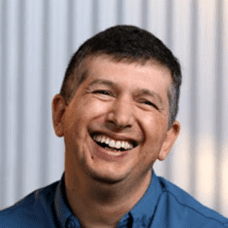GLS2015 Grander Vision | Mike Arnoult: Get a Shot. Give a Shot. ®
 At the 2010 Global Leadership Summit, business leader Mike Arnoult received a Grander Vision. Following a session by Blake Mycoskie of TOMS Shoes, Mike envisioned a way that his company, Walgreens, could utilize the one-for-one model to provide vital healthcare in developing countries. He courageously began to make the case within Walgreens – ultimately resulting in the successful Get a Shot. Give a Shot. campaign. Because Mike acted on a prompting from God, millions of children have received life-giving vaccinations.
At the 2010 Global Leadership Summit, business leader Mike Arnoult received a Grander Vision. Following a session by Blake Mycoskie of TOMS Shoes, Mike envisioned a way that his company, Walgreens, could utilize the one-for-one model to provide vital healthcare in developing countries. He courageously began to make the case within Walgreens – ultimately resulting in the successful Get a Shot. Give a Shot. campaign. Because Mike acted on a prompting from God, millions of children have received life-giving vaccinations.
In 2014, at the start of the flu season, The Gates Foundation wrote an article on the unique public/private partnership between the UN Foundation and Walgreens. Click here to view the original article.
By: JAMES COHN, DEVI THOMAS
In the U.S., we often take for granted that we’re now able to go to a pharmacy any day or night to get a flu shot or other vaccinations. But in many developing countries, people don’t have this luxury, and even going to a doctor’s office or hospital for basic preventive health services has its challenges.
In July, representatives from the UN Foundation and Walgreens traveled to Arusha – a city in northeast Tanzania, to understand the barriers residents and healthcare providers in many countries in the world face every day.
In Tanzania, lack of access to proper medical care makes it difficult for children to reach their full potential. It’s estimated that more than 40 percent of the population is under the age of 15, which translates to an increased need for education and a real opportunity for mentoring youth to lead healthy and productive lives.
While in Arusha, we visited a vaccine clinic at Selian Lutheran Hospital, where children ranging in age from just one day old to 18 months were brought in to receive polio and measles vaccines.
Here, and in other developing countries, some mothers may travel hours to bring their children to a clinic for vaccinations — some by car, but many more by foot. Dr. Stephen Swanson, M.D., an American pediatrician, has been in Arusha since last fall. He’s come here to train Tanzanian doctors in pediatrics so that children can receive the quality care they need to live a healthy life.
“In Tanzania, there’s an appreciation for vaccinations because many citizens have personal experience with the devastation caused by vaccine-preventable diseases. Many children often don’t survive past their fifth birthday because they don’t have access to life-saving immunizations,” Swanson said.
Globally, more than 100 million children are immunized against vaccine-preventable diseases every year, including pertussis, measles, polio, tuberculosis, influenza, hepatitis B and others. Vaccines are credited with saving millions of lives every year, yet the challenge remains – and the statistics are staggering: one in five children worldwide lacks access to life-saving vaccines and a child dies every 20 seconds from a disease that may have been preventable.
Public/private partnerships are critical to providing and creating greater access to life-saving vaccines for those who live in hard-to-reach communities. Understanding the value and impact of vaccines is invaluable as we continue to develop innovative programs and initiatives to address some of today’s global health disparities.
To help provide greater access to vaccines for children in developing countries, while also improving immunization rates in the U.S., Walgreens and the UN Foundation developed “Get a Shot. Give a Shot.” – a campaign through which Walgreens donates the value of a life-saving vaccine for each vaccine it administers at its pharmacies and Healthcare Clinics.
The campaign first launched in 2013 and thanks to its customers, the company reached its goal to provide the value of three million vaccines. By 2015, Walgreens hopes to provide six million polio and measles vaccines to children who need them most.
Improving immunization rates in the U.S. and around the world through greater access is a vision shared with the Global Polio Eradication Initiative, and the Measles and Rubella Initiative and the Global Vaccine Action Plan, which aims to prevent millions of deaths by 2020 through more equitable access to vaccines for people around the world.
There are many ways we can help. And through “Get a Shot. Give a Shot.,” one flu shot or other immunization here in the U.S., can go a long way toward helping to save the life of a child half way across the world.
Learn more about the Shot@Life Campaign at www.shotatlife.org
Equip, encourage & inspire global leaders with a gift today
When you give to the Global Leadership Development Fund, your gift inspires and equips Christian leaders, facilitating transformation in some of the world’s most challenging environments.


